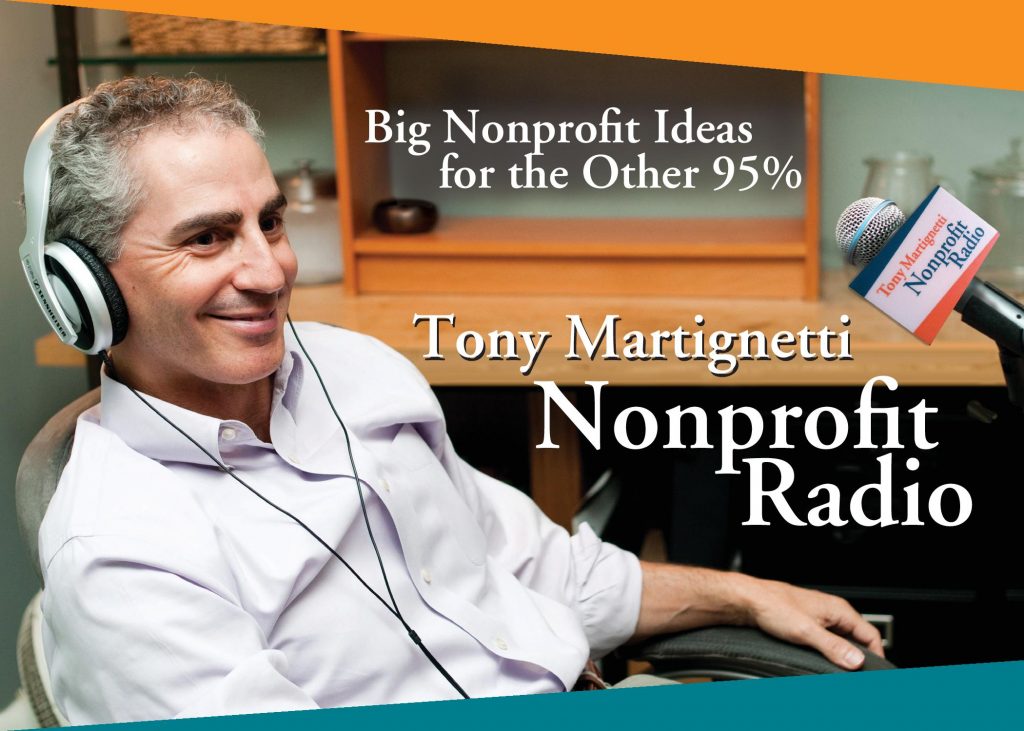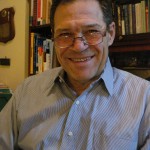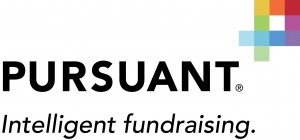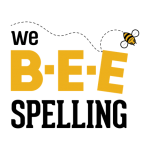
My Guests:
Michael Davidson & Brian Saber: Engaged Boards Will Fundraise
Michael Davidson, the board coach, and Brian Saber from Asking Matters, have teamed up to write the book that reveals how to get your board to fundraise: Engage them.
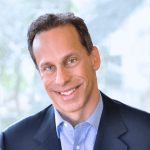

Listen to the podcast
Podcast: Play in new window | Download
Get Nonprofit Radio insider alerts!
I love our sponsor!
![]() Turn Two Communications: PR and content for nonprofits. Your story is our mission.
Turn Two Communications: PR and content for nonprofits. Your story is our mission.
We’re the #1 Podcast for Nonprofits, With 13,000+ Weekly Listeners
Board relations. Fundraising. Volunteer management. Prospect research. Legal compliance. Accounting. Finance. Investments. Donor relations. Public relations. Marketing. Technology. Social media.
Every nonprofit struggles with these issues. Big nonprofits hire experts. The other 95% listen to Tony Martignetti Nonprofit Radio. Trusted experts and leading thinkers join me each week to tackle the tough issues. If you have big dreams but a small budget, you have a home at Tony Martignetti Nonprofit Radio.
View Full Transcript
Processed on: 2021-10-14T20:42:00.397Z
S3 bucket containing transcription results: transcript.results
Link to bucket: s3.console.aws.amazon.com/s3/buckets/transcript.results
Path to JSON: 2021…10…563_tony_martignetti_nonprofit_radio_20211018.mp3.39978918.json
Path to text: transcripts/2021/10/563_tony_martignetti_nonprofit_radio_20211018.txt
Hello and [00:00:12.12] spk_5:
welcome to tony-martignetti [00:00:20.54] spk_2:
Non profit radio big non profit ideas for the other 95%. I’m your aptly named host of your favorite abdominal podcast. [00:00:27.74] spk_5:
Oh, I’m glad you’re with me. I’d be forced to endure the pain of [00:00:29.56] spk_2:
cellulitis if you inflamed and [00:00:31.81] spk_5:
irritated me with the idea that you missed this week’s show [00:00:35.74] spk_2:
engaged boards [00:00:37.14] spk_5:
will fundraise [00:00:39.24] spk_2:
Michael Davidson, the board coach and brian Saber from asking matters have teamed up to write the book [00:00:49.54] spk_5:
that reveals how to get your board to fundraise engage them [00:00:52.04] spk_2:
and tony state too [00:00:55.94] spk_5:
podcast pleasantries. We’re sponsored by turning to communications [00:00:58.19] spk_2:
pr and content for nonprofits. [00:01:03.14] spk_5:
Your story is their mission turn hyphen two [00:01:11.44] spk_2:
dot c o. It’s my pleasure to welcome back Michael Davidson and brian Saber, Michael is a consultant specializing in nonprofit board development management, support, [00:01:22.34] spk_5:
leadership, transition and executive coaching for nonprofit managers. He has over 30 years experience in nonprofit board and managerial leadership. [00:01:29.04] spk_2:
Michael’s at board coach [00:01:31.11] spk_5:
dot com. [00:01:32.94] spk_2:
Brian Saber is a co founder of asking matters [00:01:43.34] spk_5:
and one of the fields preeminent experts on the art and science of asking for charitable gifts face to face. He’s been working with boards for more than [00:01:45.38] spk_2:
35 years [00:01:46.66] spk_5:
to help unlock their fundraising potential [00:01:49.94] spk_2:
brian’s company is at asking [00:01:51.78] spk_5:
matters dot com and he’s [00:02:00.24] spk_2:
at brian Saber together. Michael and bryan co authored the book engaged boards will fundraise [00:02:03.64] spk_5:
how good governance inspires them. [00:02:06.44] spk_2:
Their book [00:02:07.32] spk_5:
brings both of them and back to nonprofit radio [00:02:12.24] spk_2:
Michael and brian welcome back to [00:02:15.54] spk_0:
the show what a pleasure great to be back very. [00:02:17.85] spk_1:
Happy to be here [00:02:18.61] spk_0:
Glad to have you. [00:02:21.84] spk_2:
Yes, congratulations on the book. Thank [00:02:22.12] spk_0:
you, [00:02:27.44] spk_2:
Michael, your book title is emphatic. There’s no hedging no qualifications. [00:02:31.34] spk_0:
Absolutely. How can you be [00:02:32.40] spk_5:
so sure engaged boards will [00:03:44.94] spk_0:
fundraise? Well, it’s a it’s a great, great question, tony and it really is the answer to that is in the title if if you’ve got a board that really does care about what the mission and the vision is of the organization, that’s why they’re there. If they have that personal motivation to be involved in your organization and to care about the impact that you’re having in the, in the world and are engaged in the ownership of that impact, in managing it. They care enough to do this. What are our whole premises? We can teach board members how to fundraise, brian has been doing that forever. Our job is to figure out how do we make board members want to fundraise and making them want to fundraise is engaging them, engaging them with their fellow board members, connecting them with their fellow board members and deeply connecting them with the vision and the passion that brought them to your board in the first place. That’s the simple, really the simple answer for this. If they’re engaged, they’re gonna want to, they’re gonna want to make this organization happen, which includes raising the money for it [00:04:00.24] spk_2:
and much of the book is getting that engagement doing it properly. We go from details like the board meeting, which we’re gonna talk about two to broader engagement. You want [00:04:10.41] spk_0:
Yes. In fact, you say [00:04:13.04] spk_3:
fundraising must be [00:04:14.15] spk_5:
fully integrated [00:04:15.98] spk_2:
with the active engagement [00:04:17.71] spk_5:
of the board [00:04:18.72] spk_2:
in its, uh, fiduciary and leadership roles. [00:04:22.78] spk_0:
Right [00:04:34.24] spk_2:
flush that out for us a little bit. Uh, you know, we got plenty of time together. You don’t have to, you don’t have to pack it all into one answer. But why are we starting to get into their fiduciary in leadership roles? And, and there that relationship with fundraising? [00:05:18.84] spk_1:
Well, let’s look at the budget for example, and often a budget is presented to the board. The staff puts together a budget and if it seems like it adds up the board approves it often it’s maybe just slightly incremental from the last one. Not a lot of explanation, sometimes a lot of detail without higher level explanation. And so the board is basically just, I hate to say rubber stamping it and that, that’s just that’s very passive if the board is involved in developing the budget and has really given a sense of what can be accomplished with a larger budget [00:05:29.04] spk_0:
and get to choose [00:06:34.24] spk_1:
and say yes, we’d like to do more. And we understand our role in that, that we can’t just tell the staff to raise more here is where the money comes from, here is our role. This is how we develop larger donors. It does take the board unless where university with a big major gift staff were it for most organizations. The board is the major gift staff. We get that we want our organization to do more. We’re going to agree to this budget, knowing all of that, then they’re in it together. Everyone around the table is a knowing, a willing participant very different. And we don’t see a lot of that happening. And yes, it’s hard on, especially smaller organizations to get all of this done. But it’s critical. It’s critical not to shortchange the process. If we short change the process, we can’t expect the board too enthusiastically go out and fundraise. This reminds me [00:06:34.96] spk_2:
of that [00:06:36.04] spk_0:
old conventional [00:06:56.04] spk_2:
wisdom, you know, ask for if you want money asked for an opinion, your, if you want to, if you want an opinion, ask for money, you’re, you’re, you’re saying you’re getting the board’s opinion, you’re calling an engagement. But it’s bringing in the board’s opinions about what the organization should be doing. What should be paring back where it should be heading. Is that, is that, is that essentially what you’re doing is getting bored getting bored opinions [00:08:57.24] spk_0:
an ownership because it’s not just their opinion on the budget. They put their opinion into this budget, They work with staff on developing it. But at the end of the day they raise their hand and they say, I approve this budget with these particular fundraising goals included. It. I agree to this. They make that decision. You know, one of the things that’s interesting in connection with this, this puts a lot more work on staff. They got to spend more time on the budget. And very often stand said, oh my God, leave the board, we’ll do the budget. Don’t bother them, it’s going to take too much time to explain all of this to them. They may disagree with us on our priorities, they may think other things are important. I don’t want to get involved in that. Let’s just give them a budget a quick five minute vote and done right. So it requires staff executive director to say, you know, if you want a board that’s going to fundraise, you’ve got to spend the time listening to them explaining to them engaging with them and they may come out somewhat differently than you do. You’ve got to live with that. You got to live with that. It’s not your organization, it’s your joint organization. That’s, you know, that’s a lot of work. So, you know what we’re saying may sound simple, you know, has for advice. You get money. But the reality is, there’s a commitment involved, Both on the part of board members and on the part of staff to make this, you know, staff comes to us all the time, but Brian and I’m here this 10 times a day. My board won’t fundraise. Oh, well, what are you doing to get them to do that right, just another [00:09:00.48] spk_1:
piece of it, which we’ll get to it, having them do the right fundraising. So that’s the other half of the equation, which cover because it is a double edged sword there. Okay. [00:09:10.54] spk_0:
Uh, [00:09:20.04] spk_2:
Michael, can we at points then push back when, when it comes time for, for board commitments around fundraising and say, you know, you all agreed to the, to this budget, You took ownership of the budget, You held your hands up and voted well, now it’s time to fund what you all agreed to. Can you, can you sort of give it back to them that way? [00:09:39.24] spk_0:
Absolute. And it requires one on 1 work with each board member. And for me, that’s the role of the Resource Development Committee. So let’s talk about it. We’ll get to brian’s magic number of, you know, what are you going to do? Well, And uh, yeah, [00:09:52.62] spk_2:
well, before we get to the fundraising part, I want to, I want to spend time on the engagement part. [00:09:56.85] spk_0:
Sure. [00:10:08.64] spk_2:
Let’s not go anarchy economy. I wanna, I wanna, I wanna, I wanna get this. You talk about a, a culture that creates full engagement. Uh, who’s best for uh, I don’t know who to call on a Socratic method from law school, I don’t know. Uh, but I don’t want to go like ping pong either brian Michael, brian, Michael, death too monotonous. So, you know, who’s, who’s best for talking about creating this culture of engagement at, on [00:10:26.55] spk_1:
the board. We love [00:12:29.04] spk_0:
Michael. okay for me, you know, this came out of it, I did a workshop with a number of consultants on helping them learn how to do what I do. And one of the consultants brilliant actually, we’ve got a quote from her and Catherine devoid. Catherine said, you know what you’re talking about, Michael is a board culture and peter Drucker, the management bureau says, you know, culture eats strategy for breakfast. What we want to do when I talk about a culture is a culture is a team for me aboard, culture is a team. We see ourselves as a team. We understand we know each other, we’ve spent time with each other and we jointly want to do something. We jointly believe in this in this mission. Okay. And we encourage and support one another. So the culture at base has a system where board members know each other and work together on various kinds of things. Then you have the motivation and then board members can encourage and hold one another accountable for what they’re doing. So the culture starts with making sure that board members know one another personally personally know who they are, who they are and from that you can begin to build a sense of a team, we’re in this together, we’re not separate. It’s a very, it’s a very different notion of what the board is. You know, you and I tony were lawyers, right? So we start okay, this is the fiduciary responsibility. This is the board. This is what they’re supposed to do brian and I are asking the question, yes, we know what they’re supposed to do. How do we make them want to do it? And part of it is the mission, but part of it is their sense of responsibility to each other. Think about a sports team, right? What makes a good sports team? Not a collection of stars, Right? It’s a collection of individuals who don’t want to let one another down. I want to do my best because I’m with you were doing this together. You get the matter [00:12:45.94] spk_2:
used to the metaphor, Michael of the rowing because you’re a rower and you had the coach boat and rowers have to be working in unison, [00:13:48.34] spk_0:
right in unison. And there’s a great quote which I use in the book from the boys in the boat, in which the coach tells this roller, right? You know, you’re a good rower. Let me tell you what you need to do to be a great rower to be a great rower, you need to trust every other guy in the boat when you trust everybody else. You will be great. That’s interesting notion, right? Because I know if I know Tony, I know you’re pulling as hard as you can, I’m gonna pull as hard as I can. If I’m not so sure about you, Why do I kill myself. Right? But I know you tony You’re gonna pull with everything you got. And so I’m gonna pull with everything I got. It’s a very simple kind of notion, but to us it’s very, very important. It’s creating the board as a group, not as a collection of separate individuals as a team and they hold one another accountable and they don’t want to let one another down. It’s the experience we’ve all had brian. How do we start [00:13:49.60] spk_2:
building this trust among board members? [00:13:59.14] spk_1:
Friend? Well, first we look at the time we, they spend together and how we’re using it. So I always say to people, it’s amazing the percentage of a board members time that is spent in board meetings and the percentage of the board meeting time that is not spent well. [00:14:15.34] spk_0:
So [00:16:10.84] spk_1:
if you’re going to have a two hour meeting every other month, that’s 12 hours and, and maybe they’re in a committee meeting once every two months or once every month or something. But almost all the time is spent together in these meetings. And the meetings have so much, uh, reporting, there’s so much happening there, that doesn’t have to happen. Uh, and, and, and so the meetings don’t allow for this team building where, where the board members are grappling with the big issues and wrestling with the future of the organization, uh, how the organization is presented where it fits in a big, important issues and they should be wrestling with those because they’re the board and they have the responsibility for moving this organization ahead, keeping it safe, making sure it’s doing the right thing. And uh, so many board meetings have very little discussion of program presentation of program reporting back from board members of what they’ve seen in the program. And lots of board members rarely even see the program in action. So the board meetings are very report central centric. No one wants to give up their their chairman’s report, their executive directors report this report, that report. And we try to move people towards these consent agendas where all the reports go out in advance are simply approved and you have to read them. You have to read them in advance because you can’t just come to the meeting and expect to have a conversation about them even. And even the action steps should be discussed. You [00:16:18.84] spk_2:
even suggest in the book that questions about what’s in the consent agenda have to be submitted in advance of the meeting. You can’t come to the meeting with your questions about the previous the previous minutes or or everything or the reports that are in the consent agenda. You got to submit your questions in advance. So we know you’ve read them. [00:16:30.54] spk_5:
It’s time for a [00:16:37.44] spk_3:
break turn to communications. You want relationships with journalists than hire former journalists [00:16:39.92] spk_0:
who know how [00:17:10.14] spk_3:
to build those relationships, including one of them. One of the partners worked as an editor at the Chronicle of philanthropy. But both partners, our former journalists. So they know how to build those relationships. They know when it’s the right time to contact journalists. They know how deadlines work and they can coach you on talking to the journalists once they get you those relationships. So you want the relationships higher folks who used to [00:17:11.64] spk_5:
do that work, [00:17:44.54] spk_3:
turn to communications, they’ll get you set up. They have existing relationships that can help you build new relationships with journalists. And where are those existing ones? You’ve heard me regale you with the the litany of media outlets were turned to has relationships. So figure turned to communications, talk to them, turn hyphen two dot c o Your story is their mission [00:17:48.64] spk_5:
now back to [00:17:49.72] spk_3:
engaged boards [00:17:51.11] spk_5:
will fundraise [00:17:53.94] spk_2:
how many of us has been in board meetings where people, you can see, you see, you see people for the first time, they get there 10 minutes early and they’re poring over their board notebook and you’re just sure that that’s the first time they cracked it open 10 minutes before the meeting. And what’s really, they’re wasting [00:18:10.46] spk_5:
their time at that point. [00:18:38.54] spk_1:
And then you get one or two board members who hijack a meeting with questions and they shouldn’t be allowed to, no one gets to hijack a meeting. And if you have this, this structure in place, which is much more about discussion and moving the organization forward, building the team and such, Then there isn’t that time for the small questions. I mean I get driven crazy when budgets are presented and someone goes to one small line item and ask the question. It’s so bad. In many ways. We’re trying to move people away from [00:19:58.44] spk_0:
that tony There’s another side to this and that’s the role of the executive director in this. Because what we’re urging is that there’ll be substantive questions, for example, on such and such a program. What is the impact of that program and how do we measure that impact? Right. That’s an important engaged, more discussion. Executive directors many say, wait, wait, wait, wait. I don’t want them getting into program. That’s my job. If they start talking about programs, it means they’re trying to manage how I do my my implementation work. Right? And we say we want we want boys to be faced with the real issues, as we say in the book, the good, the bad and the ugly well, executive directors don’t like to do that. They just want to give the board good news put out their report and go home and hope that they don’t bother them. So this partnership takes too right. You’ve got to have an executive director who is willing to engage with the board in these substantive discussions about the future of the organization about the problems that the organization is having about its challenges, not just a good news. So it takes it’s two sided. You can’t do this. [00:19:59.87] spk_2:
What is the appropriate role for a board member? Board members [00:22:15.14] spk_0:
around program Michael, for me it’s about impact, it’s not about how you do your program, it’s about what your program is designed to accomplish. And how do you measure what’s the vision, what are you trying to do? How do you measure that impact? I’ve got, you know, I’m on the selection committee for the Awards of Excellence and nonprofit management and one of the things that would look at his program impact. Let me give you one of my favorite examples and that’s the board involved in impact. Right? Um you know, I’m a rower. So this is it’s a rolling story. Okay, so wonderful organization, new york city koro new york no new york works with local high school kids, makes them into competitive rowers, which is really good for their college applications, works with them on college prep stuff and stuff. They were off the wall about the results of their program, 98% of their kids were getting into college. Fantastic. Right. Fantastic. Well. But they had also been collecting data on their kids and one of the things that they saw in their data is that their kids were not doing so great in college. And so the executive director and the board started to look at this data and said, you know, we’re focusing on the wrong end point. Our endpoint should not be college acceptance. Our endpoint, our impact point should be college graduation. So now what do we have to do programmatically to reach that? And we have to put resources, the different kinds of programs and the program to keep track of the kids once they’re in school, bring them back so on and so forth. But it was the board and the executive director looking at the data and looking at the question, what is our goal? What is the impact we’re trying to make? And by doing that, they jointly changed where they were directing resources, some of the staff that they were doing and stuff like that. So that’s an example for me of the board being involved in program, but at the right level at the level of impact and the level of data, not how do you teach? And that’s what executive directors tend to be afraid of. Once they start talking about program then they’re going to start talking about how do I teach you, How do I run my classroom and so on and so forth. And then to the board job [00:22:26.84] spk_2:
brian, let’s talk a little more about nuts and bolts of [00:22:29.27] spk_5:
meetings. [00:22:57.44] spk_2:
If if this is the primary time that the board is spending together, whether it’s committee meetings or or full board meetings. Uh in fact, I’m imagining you two would advocate for social time for the board as well. But so we can, you know, we’ll get to the social part, let’s let’s talk more about some nuts and bolts meetings were trying to build a team, we’re trying to build trust. We want to focus on the right things. What, what more advice they have around meeting structure. [00:24:32.74] spk_1:
Well, first of all, the agenda needs to be developed jointly by the executive director and board leadership. Sometimes that’s just the chair, sometimes that’s the entire executive committee and it needs to be developed in advance and everyone needs to know their role and be prepared, not just wing it. Uh, so that’s, that’s the first piece. I often hear boards talking about one hour meetings. Now this idea of making meetings very efficient and it reminds me of this issue with government and people want small government. It’s really better government that you want, right? You don’t want to waste the time. It’s not that you’ve got to make it smaller, but it needs to work. Right? And I think an hour is not enough time. I think an hour and a half to two hours gives you uh, the flexibility to dig into a topic. Uh, you have to have some sort of program presentation every time there’s, there’s no substitute for that. The more we connect board members program and give them an opportunity to ask questions about it to learn about it, the stronger their connection will be. So there needs to be programmed presentation, Michael and I prefer that board members are out there, uh, seeing program and are bringing back their own recollections and sharing those with the board. Uh so those those are important. Uh [00:24:34.34] spk_0:
the [00:24:55.54] spk_1:
uh we should not have a long executive directors report. We should be asking the executive director just as we ask all the committee chairs to submit their reports in advance. Uh The chair’s report should be very short at the very beginning, very high level, Michael, would you add to that? [00:25:17.34] spk_0:
Yes, I didn’t do exactly. One is I love to time my agendas. I lay out, you know, we we lay out what’s gonna be and then I put five minutes, 15 minutes, whatever it is and that does a couple of things. No one, it focused the board, it makes us think about where we want big discussion and where we don’t want big discussion. And it also gives the chair of the power to cut things off. So if someone’s going off on a on a rabbit out, you know, at the minute, I know we’ve only got five minutes for this, we have to end discussion now because otherwise they’re not going to get to the I think so, timing the agenda is a big deal. You know, Michael, I’ve [00:25:41.58] spk_2:
even seen where a board and I’ve seen this in other meetings as [00:25:45.58] spk_5:
well outside the board [00:25:46.67] spk_2:
setting, where [00:25:47.80] spk_5:
there’s a timekeeper [00:26:09.34] spk_2:
appointed so that the chair can keep the conversation flowing and relevant. And the timekeeper is the one who says, we only have three minutes left for this topic. you know, like mr mr and mrs board chair, there are only three minutes left on this topic, you know, it’s up to you to decide what you want to do, but I’m the timekeeper and I’m letting you know there’s only three minutes left, just another another [00:27:34.74] spk_0:
enforcer. And it’s an interesting notion, I actually kind of like it he goes back to as you know, I spent a good part of my legal career as a prosecutor, you know, and the notion of good cop, bad cop, right? So so the board chairs the good cop or oh no, I’m not controlling this, right? Someone else is telling us we have to stop, I’d love to let you talk forever, right? Yeah, good. You know, so it’s a good thing. The other thing too is there’s a framework for board discussions which rob Acton is used in his uh in his writings and he’s you know, and he says there are three kinds of questions that boards need to be looking at generative strategic and fiduciary, Okay, generative is where are we going? Why are we doing this? What’s on purpose? Right. Strategic is how do we do it? And fiduciary other details. And you know, part of what happens is so much of board meetings tend to be taken up with fiduciary matters and not enough time on generative and strategic matters. So again, as the as the leadership team is thinking about the agenda, they should be asking, you know, are there questions of that nature, generative and strategic that we need to be thinking about, you know, so it’s the paradigm. Yeah, brian’s got his [00:28:25.44] spk_1:
hand out and I want to add to that, that when we talk about developing these board meetings, a lot of boards meet, if not every month every other month. And I’ve always felt the more often you meet and it’s not something we talked talked about in the book, but it’s something Michael and I have talked about, the more often you meet, the the more likely it is you’re going to get into more details because less has happened in the two months you get out of the meeting. Everyone has one committee meeting perhaps than your back. And, and I don’t think boards have to meet as a board every two months. I think if they meet quarterly as a board, there’s it’s easier to see the big picture. It gives more time for committee work in between and and that alone could help lessen the focus on the new sha [00:28:34.84] spk_0:
it’s an interesting question. Um I I go both ways, depending upon the organization and and the size of the board. But one of the things that’s interesting about another question about board meetings is how do we use board meetings to connect board members with one another? [00:28:49.84] spk_2:
It was going to get to this. I wanted to get to the social side [00:30:31.44] spk_0:
of this. Great. okay, okay. Yeah. So how do we, well, it’s very it’s really interesting because I think, and I’ve been thinking about this a lot as we emerge from covid, hopefully emerge from covid. Right? And, you know, very often would say, okay, you know, what we’ll do is we’ll have a cocktail party before the board meeting, have some wine and cheese, maybe after the board. Me, it’s interesting, but it’s surprise problematic because what’s likely to happen, what’s likely to happen is that board members will talk to people that they know people that they usually talk to write and they’re going to talk with them about the things that they usually talk about, right, your your your golf game, your your your your your other involvements, whatever things that they have in common they talk about. And what I’ve been trying to think about it, we mentioned in the book is how do we create, how do we structure the interpersonal connection so that it’s deeper. Um, I just did this yesterday. So whatever the most recent thing in my mind always helps. Right? So I retreated, I facilitated a board retreat yesterday, which actually was in person. Um, and but what we did was before the, before the meeting, and this can be done, we assigned pairs of board members. Everybody was in a pair of two and they had an assignment, what they had to do was to interview the other person, find out about them, what they like, what they do, what their passions are, what they care about, what they read, what kind of music they’re kids. They’re this they’re that find out about who they are as a person, and then each one had to then introduce the other at the board meeting. Okay, so this is something to take some time and you can’t do it all the time. But it’s a very interesting way. And I asked him, I said, what was this like you said, this was great. These are really interesting people. I want to work with these people. [00:30:50.34] spk_2:
There’s no going back to your team. Team building. [00:31:05.74] spk_0:
Team, yep. So if if we’re if we’re going to try to create opportunity social opportunities, we need to think about what’s the best way to do that to achieve our goals. I’m skeptical. [00:31:06.89] spk_2:
I’m a little concerned about wine before the [00:31:09.34] spk_0:
meeting. I get a little too uh a [00:31:14.07] spk_2:
little too loose lipped maybe. But but I love the idea of introducing someone you don’t know, get you to talk to somebody that’s outside your comfort zone, but ought not be because their fellow board [00:31:27.74] spk_0:
member. Yeah, [00:31:53.14] spk_1:
I had a program at one organization where I was uh, where we, we had board members go out after the meeting together and we assigned the groups so that we had a good mix and people would, would meet each other and and they were, the goal was for them to do that twice a year. Uh It’s all about time. Right? But we thought that was important time to spend so that they’d at least go out to dinner with half the board. Some of it depends on the size of your board and what you can accomplish, right? But we didn’t want groups of more than six because we wanted people to be able to talk with each other. So what we might send two groups of six out in different directions. [00:33:04.64] spk_0:
Yeah. You know, and it’s interesting. I’ve seen people do very simple things at the beginning of a board meeting uh consultant I worked with, she always starts out every board meeting with a question. So tell me about the kind of music you like. Right, two seconds. Tell me about the most interesting book you’ve read recently and why? It was interesting to you. Right? I mean, two seconds we can do that at a board meeting. It loosens everybody up. It enables people who are introverts to have to say something to get out there and talk. It puts a limit for the extroverts on how much they can talk, Right? But it’s a, you know, so you can do devices like this, recognize it because it’s important, it’s important to recognize the importance of the board culture that unless we have that sense of connection between people, none of this stuff is going to work. [00:33:11.14] spk_2:
Okay. And now let’s bring it to the, to the book title, [00:33:13.90] spk_0:
Okay, Will Will fundraise, [00:33:16.58] spk_2:
shall shall engage board shall fundraise. [00:33:19.58] spk_0:
How is No, no, no, no. We didn’t use the word shall know. I, I added shall because that’s probably that’s perspective. Okay. Prescriptive, prescriptive, I know, [00:33:41.74] spk_2:
yes, contract, contract you shall versus well, um, no, the book title is engaged. Boards will fundraise. So how does having better board meetings and board members knowing each other better through these simple social devices? Social methods [00:33:49.74] spk_5:
improve our fundraising? [00:36:09.83] spk_1:
Right. Well, as Michael has talked about a fair amount, it creates a team and a sense of joint responsibility. You think that it exists just because they have all joined this same organization, but you can’t just accept that in fact you have to work on it. So, by building this team, this camaraderie by by helping people understand each other. Uh, there is a shared sense of of, of responsibility. Second, by really engaging the board in these discussions and having the board understand the organization at a more nuanced and important level. It is easier for them to talk about the organization to feel comfortable doing it to represent it properly and to do it passionately, which is key to fundraising right? Being an ambassador for the organization. So many board members, uh, say I I don’t know enough about the organization to go out and talk about it. I’m afraid I’m going to say the wrong thing. I don’t know the organization like the executive director does. And one of the steps here is to get board members more comfortable as ambassadors talking about it. Uh, and it’s funny because I always say to board members, you don’t need to know all the details. You don’t have to know every little thing and all the numbers and such. You just have to be passionate and authentic to tell a good story and get people excited about the organization. And it incense goes hand in hand with the board meetings, Right? And if we’re concentrating on Mnuchin the board meetings, then the board members think they need to know the menu. Sha if we stay out of the Mnuchin the board meetings, then the board members can feel okay, this bigger picture is what’s important. So, so we build a sense of responsibility and we build, uh, more of a comfort in talking about the organization. We also build an understanding of why the funds are needed and what they will do, right? It’s not just, we need money. Uh, will you give me money? I love this charity, but this is the impact we’re going to have. They can talk about that. So, okay, so that gives them a basis for going on fundraising [00:36:48.23] spk_2:
and that’s sort of a perfect transition to getting now to the discussion of engaging the board in the right kind of funding in fundraising. So, you know, listen, you just get, you got to get the book to, to learn more about how to engage your board. Um, they talk about the different duties of care and loyalty and obedience that board members have an, uh, governance. There’s, there’s good talk about governance uh, that you know, belonging in in one place and management, belonging by the other management, by staff, governance by the word. You gotta, you gotta be the book to get more of that detail about engaging. [00:36:50.13] spk_5:
It’s time for Tony Take two. [00:37:02.03] spk_3:
Oh, can I tell you how much I love sending podcast pleasantries. Thank you. I’m just grateful that you are a [00:37:02.21] spk_5:
supporter of the show [00:37:03.67] spk_3:
listening, whether you sample or you [00:37:08.63] spk_5:
subscribe however you do it. listen all at once to 12 shows or you are the first one [00:38:03.82] spk_3:
after the shows get published each monday. The first one clicking Thank you pleasantries to you are over 13,000 podcast listeners in aggregate, but you, you’re the person I’m talking to, I’m talking to you right now. I’m thanking. I thank you and I’m thanking you. That’s passive, isn’t it? I’m thanking you. I thank you. I know that’s active. Thank you. Thank you for listening. I’m glad you’re with us. Glad you’re supporting the show. I’m glad the show brings you value. Otherwise you wouldn’t be hearing me hearing me right now. You want to shut me off years ago. So thanks, thanks for being with me. Thanks for being with nonprofit radio That is Tony’s take two. We’ve got boo koo, but loads more [00:38:06.37] spk_5:
time for [00:38:07.82] spk_3:
engaged boards will [00:38:10.41] spk_5:
fundraise. [00:38:15.32] spk_2:
So now let’s talk about engaging the boards, you know, specifically in fundraising. Um, you two [00:38:18.11] spk_5:
have [00:38:19.12] spk_2:
was, I think six different six things, you know, like make the case identify the resistance. Is that the best way to talk through the engaging the boarding fundraising? Or is there a better [00:41:15.91] spk_0:
way for me? There’s another way to start it. And that is what brian has been talking about right now is giving the board members the basic tools, Right? Thank you. They know how to tell a story or they’ve got a story to tell them. But one of the things that we look at is the fact that there is discomfort resistance about fundraising. It is not something we do in our normal lives, right? We, we do our jobs, we’re professionals, we don’t go out trying to engage other people in the things that we’re engaged in. Right? So they need help doing that. It’s part of the team. Thing is they want to feel, I want them to feel responsible to one another. But in addition, there has to be some guidance from either from fellow board members are from staff into how to do this. So board member says, okay, I, I know I know these, I know these people, you know, I’m comfortable with and I’m willing to talk about it. I’m a little, I’m uncomfortable asking them for something. They were gonna tell me, no, it’s gonna harm the relationship and stuff like that. So time needs to be spent. Either one on one with board members and within a member of the resource development Committee or is there a member to go through? Okay. Let’s figure out how you do this one with respect to the resistance that you have about it. How do you overcome that resistance? You know, what do you do? So, for example, one of the techniques I told board members is you never want the first conversation you have with somebody about your organization to be a conversation we’re asking for money. That’s the kiss of death. So what you’ve got to get to do is OK, here’s what you got to do over the next few weeks. You are you gonna talk to any friends? Yes, I’m gonna talk to some women. Okay. Here’s what I want you to do in those conversations. Find something that they’re interested in. That allows you to bring up your experience with this organization. You’re not asking for money. You’re not ask them to do anything. You’re just bringing this organization into the conversation. That’s your job. Okay. Now, after you do this, let’s come back and talk about it and tell us what your experience is. Now you can do this with the entire board, right? We’re at a board meeting. Okay, Everybody next week or between now and the next board meeting has to have one of these conversations with a friend come back and report at the next board meeting. Let’s see what we learned? What was difficult? What worked did they ask you questions? What would be the next steps? So they’ve got to both feel responsible for one another. But it also at the same time gets support from one another for doing this incrementally, because this is new to all of us. It’s new because you have [00:41:31.41] spk_2:
an exercise in the book seemed ideal for a board meeting where you uh, you ask for board members to list their objections to fundraising and then list there a personal experience of either having asked or being asked in the past. And the two don’t do don’t align like the reality cancels out the objections exactly whose idea is that. Is that yours, Michael? [00:43:10.90] spk_0:
Or that’s that’s me. Yeah, it’s a very simple exercise. You know, I I like to draw upon personal personal experience. I believe that board members got the answers to all these things I’m concerned about. They just haven’t talked about it. My job is to get them to talk about it. So, yeah, they’re going to tell me about I don’t want to fundraise. That’s going to be, this is gonna be that they’re going to hate me, bah bah bah bah bah fine. Okay. Now, let’s talk about what actually happened in your life? Have you ever given money to anybody? Why? What was there about that circumstance that made you comfortable and want to do that? So we take their experience and bring it back work. I just, I’m gonna intercept here and you can cut this out if you want. One of my later readings is I’ve gone back to the Socratic dialogues, Plato’s writings about Socrates because what Socrates believed was that everybody had the answers to all these important questions in their head and his job was just the program and ask the questions to get it out. And I believe, I believe this about boards. Our job is to use their experience, not tell them what they’re doing wrong. Take what they’ve done and learn from it and help them learn from it simple. [00:43:13.70] spk_2:
You’re right. That that’s worthless. I’m gonna cut that [00:43:15.63] spk_0:
out. Yeah. [00:43:19.08] spk_2:
Right. [00:43:19.58] spk_0:
But yeah. So [00:44:21.99] spk_1:
you adding to what Michael said, one of the, one of the kickers here is board members having to ask all their friends only to be asked to give gifts in return to the other organizations that you know with pro quo. And I’ve been talking about this for a decade ad nauseam because it is horrible short term transactional fundraising. All transactional. And it’s gotten really bad in our field to our detriment. And everyone gets sort of, uh, the organizations get stuck on this. It’s like, uh, like cocaine, right? And, and, and and can’t move away from it. Well, we need the $50,000. The board raises and like, Okay, well your board is going to hate doing this type of fundraising, they’re not going to be inspired when they leave, all those gifts are going to leave with them and so forth. So you’ve got a short term gain, you’re getting some money in the door. But everything else is wrong. We don’t, I always had people good point [00:44:25.11] spk_2:
about just the last one you said, I want to just amplify when the board members leave. Those kids are going with them. When I just, I just wanted to amplify that. [00:44:33.85] spk_1:
When I say that to boards, a light bulb goes off, I say, [00:44:38.03] spk_0:
I’m not, [00:45:35.39] spk_1:
if I’m on the board and I leave the board, I’m not going to keep asking just if I could give gifts to all my friends. And what what happens when you have me as a board member, uh, do this is I end up giving money away to organizations I don’t care about just to be nice. And whereas it would be better if I gave all that money into my organization that I love and tell people you give it where you love where you, where you’re excited because then I’ve made a bigger investment in my own organization, have a bigger stake, more of an investor. And if I think I first wrote about this 10 years ago that if I had one wish in the nonprofit world, it would be to stop the quid pro quo fundraising today because it’s a Sisyphean task. It’s just not getting anyone anywhere. It’s keeping them from anything strategic and it and it is burning out the board members. And when board members come to the board often they’re on their first board. They assume that this is the type of fundraising we’re going to ask them to do, which is why they have such resistance. [00:45:46.89] spk_0:
What do you [00:45:47.39] spk_2:
want to see in in its place? [00:48:49.57] spk_1:
What I want to see is the board members to serve as ambassadors and what I call many major gift officers. So let’s look, people look at the big shots, they look at the hospitals in the universities and these massive organizations Because they raise so much money and they’re very visible and they all have what we call major gift staffs. They have a staff whose sole responsibility is to take 150 200 prospects donors and cultivate and solicit them and steward them along. Right. And and those staff For year after year have these people have this portfolio if we want to call it that. And that’s great. But most organizations have a budget under $1 million. Most organizations are lucky if they have one development officer who’s doing everything. Special events, direct mail, grant writing, crowdfunding You name it and maybe has 5% of their time to actually go out and talk to significant individual donors. So what I want rather than this transactional fundraising is for every board member To be a mini major gift officer with four prospects slash donors on their radar screen who they stick with and those may or may not be their own contacts. Many organizations have people who need more attention than they’re getting and they don’t get it because the executive director and our director of development don’t have the time. I’d sooner see the board members taking donors out to coffee calling them and thanking them for gifts, attending cultivation events with them and asking them what they think than being worried about soliciting the gift. I’m much less concerned about board members asking for a gift. They don’t have to ask for a gift as a matter of fact and I only was thinking of this this past week. Major gift officers don’t always ask for the gift. So I was a major gift officer from my alma mater. I was in charge of solicitations in the midwest big gifts. And you know, there were times I asked many and there were times when someone else asked the president, the senior vice president, a volunteer. This idea that just because you’re cultivating and Stewart and someone means you are the Askar, it actually doesn’t even add up with professionals. So I want the board concentrated on this other work, which most of them are willing to do. Oh, I’ll happily call for people and thank them for their gifts. So I’d be happy to take people out and thank them and get to know them better. Ask them if they’ll come with me or send them a personalized update. And this is incredibly important work. If we’re going to build relationships. And the other point I put out, the three of us know the numbers that most, Most of the money, most of the charitable gifts come from individuals, 85, everything. Yeah. [00:48:56.82] spk_2:
When you had requests, it’s like 88 or so, but it had requested 77 or something like [00:49:39.47] spk_1:
that. The largest gifts come from people, we know if you look at your own given right and where them and individuals are really loyal. I ask people all the time on boards. This is part of breaking down that resistance. What’s the longest number of consecutive years you’ve contributed to an organization Now for many, it’s our alma mater, right? So I graduated in 84. I’ve been giving to them for 37 years and I’ll give them till I die. And many people do. That could be your church. We give for decades. So we don’t, it’s not about the short term win. It’s about what I call an annuity of gifts over what could be decades. If you bring someone in them, they get excited most of our organizations or institutions that are going going to be doing our work forever. Some are meant to put themselves out of business and resolve some problems. But most nonprofits will be here for 100 200 years assuming the planet is and helping people with medical needs, helping seniors, helping kids get educated, whatever it is, building community and we want people to have a state for a long time. So let’s have board members helped build that state with these individuals [00:50:38.96] spk_2:
and that that also relieves board members of the, the fear and anxiety of having to be the solicitor. You know, some board members will step up to that. Uh, some will with training but it’s not necessary. You’re saying board members can be building the relationships in all these different ways. May be hosting something in your home with four or 6 couples or something. All these different ways. You [00:50:42.79] spk_5:
mentioned the thank you, [00:50:43.66] spk_2:
notes the acting as the ambassador all these ways and then maybe you’re cultivating them for someone else to do [00:50:50.59] spk_5:
the solicitation. [00:50:54.56] spk_2:
Maybe maybe the board member is involved in it or maybe not. You know, it doesn’t have to be [00:51:18.26] spk_1:
right. It goes back to the good cop bad cop, the board members, the good cop and then brings the executive Director of director development and to ask for the gift that’s perfectly legit perfectly legit. I played that role many times as an executive Director Director of Development. Where I asked uh, yeah, where the board member cued it up. But I was the Oscar [00:51:48.36] spk_2:
right and you’re collaborating in the relationship, the board members reporting back, letting the Ceo no, you know, this is, this is how it went with her baba. You know the ceo is asking, you know, do you feel like it’s maybe it’s the right time for me to ask or for us to ask or is it still too early? Or look, she expressed interest in this particular program. And you know, the board was just talking about expanding that, putting putting more resources to that. This could be a very timely topic for me to bring up at a meeting with her or or the three of us know you’re collaborating around the relationship strategizing about when the best time is to actually do the [00:52:34.05] spk_0:
solicitation, right? And going back to board meetings for a second. One of the things you want to do with the board meeting is acknowledged. The people that have done this. You know, wow, let me, let me tell you, the executive director says, let me tell you that. You know brian and I brian introduced me to so and so and we had a meeting and you know, we walked away with a check for $5000. Thank you brian, do you do right, celebrate it builds it celebrate the winds and it builds it into the culture. You don’t want to be the only one who never gets thank you. Right. [00:52:38.45] spk_2:
Let’s talk about the expectations, establishing [00:52:42.07] spk_5:
expectations around [00:52:44.45] spk_2:
giving and fundraising for board [00:52:47.21] spk_1:
minimums. Yes, who wants [00:52:49.37] spk_2:
to kick that off. Let’s spend a little time with that. Yeah brian [00:55:36.44] spk_1:
can I? Because I’m, I have, I’m rabbit about this one actually to, um, I cannot stand minimums and given gats I give or gets Excuse me. I believe that everyone should do their best on both. Besides everyone should give a personally significant gift as an investor in this organization and do their best at fundraising. And uh, without going into great detail, what I see time and again, there’s a minimum gift ends up being a ceiling out of floor. You think everyone’s going, ok, everyone’s gonna give at least this. But most people then give that, it feels like dues. You set the, the amount low so that most people can reach it, you still have some who can’t. And, and it’s been proven again and again, that, uh, that minimum gifts do not generate the largest gifts, minimum gift requirements don’t help. And people say, well, how do board members know what to do? And I said, well from the very beginning, and we talk about a job prospectus in the job description, You tell prospective board members, here’s the range of gifts we have board members giving anywhere from $500 to $5000 depending on their capacity. We ask people to do something very significant given the who they are and what they can do generally right. We want everyone to feel that they’ve made a gift they thought about that’s important to them. Some people ask for one of the top three gifts you give anywhere, which is a very concrete way to put it in and, and works. So on the gift front, you give people guidelines. And here’s, here’s an interesting thing you actually asked board members for a gift. I’m amazed. We’ve never best fundraising, best practice fundraising. We ask our major gift donors for an exact amount, Tony would you consider a gift of $10,000, etc? And yet we let our board members just give whatever they want to give. Why would we do that? I really push asking every board member for a specific amount that, that, that is personally significant to them. Makes them think about what’s significant And on the get side, I really believe it should be the best of your ability because if we say you’ve got to give or get 5000 a board member with a lot of capacity can just give the whole thing and not do any work or swap gifts with friends. And yet and the board member with less capacity is left, um, doing the hard work and that doesn’t make for a team. Everyone needs to do the hard work together. [00:56:58.63] spk_0:
There’s a couple of, I mean I’ve learned this from brian’s and that’s my, become my mantra, working with working with boards about personally significant gifts and there’s a couple of, there’s another consideration now, especially with, with our desire to diversify our boards, polls, we may be reaching into populations that don’t have access to resource, but they’re important in terms of perspectives that they bring to our deliberations. And so having this as the standard personally significant gift for everybody. It’s equal. We’re all equal. We’re all giving the best we can. Another part of that. And I really like what brian says about, you know, asking our board members, it’s a negotiation, right? It’s not a no, I I need $1000 from you. And that’s what you gotta do because you’re a board member. It’s what I, you know, let me, let me tell you what I give. Okay, Okay. And now here’s what I think might be reasonable for you. Let’s talk about it. Okay. Is it is that a reasonable gift for you? It’s not demanding its opening a conversation as, as the possibilities. So, you know, I mean, I’ve done some capital fundraising and very often we ended up in a negotiation. You know, I asked, I went in asking for a certain amount, which I thought that person could give or we thought that that person could give when I put that number on the table and kept my mouth shut for a few minutes. You know, so they came back and they said, well, you know, that’s a little, okay. Let’s talk about it then. [00:57:20.23] spk_2:
Support. Support training. It could be training could be staff, support for the, for the board that the, that the, uh, the employees, the staff are, are obligated to give either their own or through a consultant. What kind of, what kind of board, what kind of support do we need to give our board members around fundraising? [00:57:41.83] spk_0:
Yeah, there are two, [01:00:39.01] spk_1:
two pieces here. The first gets back to something, Michael said a long time ago about staff and the need for staff support in terms of the board meetings and the board members being involved, board members will only help with the fundraising. To the extent they have staff support. They’re always gonna need staff guidance materials, someone to bounce ideas off of and, and such staff need to be managing this, reminding board members of, uh, their next action step with a certain donor, um, providing materials and so forth. So, staff have to keep the tracker, as I call it this, even if it’s an Excel spreadsheet with a list of everyone and who does what and, and, and, and constantly move the process forward. But probably the most important thing is training because as Michael noted, board members come with very little experience and a lot of trepidation and the more training they can get, the more comfortable, they will be the more comfortable and effective. I always ask when I do a training, how many of you have ever been asked for a gift, The way we’re talking about it. How many times has someone said, Michael would you consider sitting down with me so I can ask you for a special gift, our organization. The truth of the matter is with all the asking out there with all the fundraising in every form. Very few people end up in these conversations. It’s the big, big, big, big donors. Right? And, and so many board members have never been on the other side of the equation and really have no idea what one of these meetings about. They assume you just go in and you ask for money. You just say, you know, will you give this? They, there’s no way for them to know because they haven’t experienced it themselves. So we need to teach them what it is. Uh, and that it’s all about the relationship, which definitely takes some of the pressure off. It’s always about the relationship and it is never about the gift to me. That is the number one rule in fundraising and I will leave money on the table time and again. I just, I just coach someone an hour before this conversation who’s the head fund raiser for a program within the school because a donor um, offered up an amount before being asked for an amount and it’s a significant amount and a big step forward. And the question becomes, do I go back, do I negotiate? And some of this is happening by email and I said in knowing the stoner, I said, you take the wind, it’s about the relationship. This is much, this is big for you. There’s always next year, the year after and so forth. So teaching board members, it’s about the relationship, not the gift, whatever happens this year, that’s okay. We’re building the relationship helps them feel more comfortable because they think they’ve got to go in and come out with whatever you all were hoping for. You know, it’s a, it’s a, it’s uh, and we’re guilty of building this mindset. We as a culture. [01:03:05.00] spk_0:
The other side of it is that there are some very, for me very simple things that boards can learn how to do to build a relationship. For example, one of one of the things I very often do with a board retreat, simple exercise or on fundraising, I told people, look, you’re now going to somebody, you’re sitting in somebody else’s fundraising dinner and there’s somebody sitting next to you. Okay, So you want to have a conversation with the person sitting next to you, get to know them. So here’s your job. You’ve got to ask that person questions about what they’re interested in their lives and so on and so forth. And you’re looking for some place in them that connects with your organization. Then when you find that place, then you can introduce your organization, but that’s your job and we, you know, we pair up and people around, you know, around the room, sit down and try to have these conversations and realize that they can, because these the way in which we want to build relationships is a technique and it’s something we need to practice and become comfortable with. You know, people are not used to really interestingly asking questions. We all tell people things about ourselves, but we don’t ask them questions about themselves. So I mean that’s one of the pieces of support, right? Doing those kinds of things, telling stories quick, you all went to visit a program, tell me something that happened in that program that you saw that really was important to you that inspired you. That made you think about the value of this organization. Tell me the story. Well, people don’t know how to tell stories. They have to learn how to tell stories. It’s it’s but it’s a very simple, you know, these are not complicated techniques, but it’s all part of becoming comfortable in what brian is talking about in this ambassador role, relationship building a relationship relationship. I love the relationship, [01:03:13.80] spk_2:
not the gift. Like that, brian. All right, we’re gonna leave it, we’re gonna leave it there with the, with the support [01:03:14.55] spk_5:
idea. You [01:03:28.60] spk_2:
got to support your board members, Michael Davidson, consultant and coach. He’s at board coach dot com. Ryan saber asking matters, asking matters dot com And he’s at brian Saber, Michael brian thanks very much. Terrific. [01:03:32.80] spk_0:
Thank you. It was a pleasure tony great questions. Thank you. My [01:03:36.34] spk_2:
pleasure. I’m just, I’m just trying to keep things going. Look book and [01:03:40.96] spk_0:
the book, the book, I’m it’s [01:03:42.61] spk_2:
Michael and bryan, who cares about Michael, Bryant’s the book you want? The book is, [01:03:46.72] spk_0:
the [01:03:49.80] spk_2:
book is the book is engaged, boards will fundraise how good governance inspires them. It comes out this week, this week of october [01:03:58.74] spk_0:
18th. Yes, [01:04:00.34] spk_2:
it’s not a long book, but it is long on value as you can tell from this outstanding conversation, lots of value in the book [01:04:08.69] spk_5:
next week. [01:04:09.65] spk_3:
Deborah Kaplan pa [01:04:13.29] spk_5:
loves new book. The time for [01:04:14.99] spk_3:
endowment building is [01:04:17.45] spk_0:
now [01:04:19.49] spk_5:
also very emphatic, [01:04:20.77] spk_3:
just like uh just [01:04:22.23] spk_5:
like engaged boards will fundraise [01:04:39.79] spk_2:
if you missed any part of this week’s show. I beseech you find it at tony-martignetti dot com. We’re sponsored by turn to communications pr and content for nonprofits. Your story is their mission turn hyphen two [01:04:40.92] spk_5:
dot c o [01:04:42.89] spk_2:
Our creative producer [01:05:13.09] spk_4:
is Claire Amirov shows social media is by Susan Chavez. Mark Silverman is our web guy and this music is by scott stein, thank you for that information scotty You with me next week for nonprofit radio big non profit ideas for the other 95% go out and be great. Mhm






